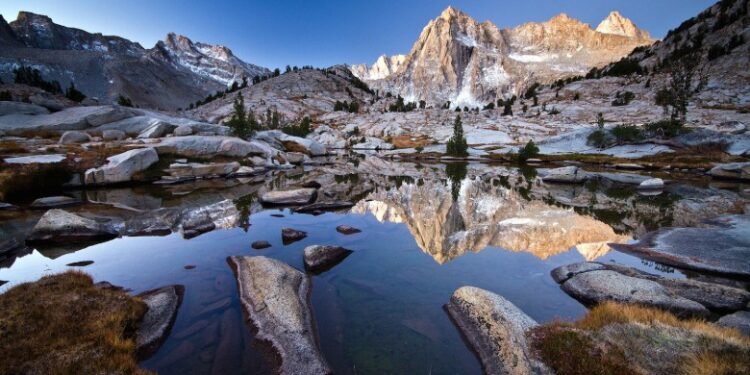During election week, it’s tempting to stay glued to a screen, searching for every new scrap of information. In that way, this election cycle has been particularly overwhelming. As the futures of institutions, natural resources and civil liberties remain uncertain, it can be hard to take time, to reflect and gain perspective.
We went into the archives to find stories about grief, rage, joy, hope and finding connection — with each other and with nature. We hope you take time to reflect and maybe find meaning in some of these pieces.
What we love will save us
In troubled political times, a trip to the mountains.
“But it’s not enough, is it? Is our nation adrift, hijacked by mountebanks and neocons and thugs? It is not enough to hate them. We must remember what we love. Time spent saying no is, at some point, time robbed from the yes that must follow. A long time ago I read Jesus’ words “Do not resist evil” and wondered what in the world he could have meant. Maybe this: We must stand on what we love — live it, be it and bring it.”

Hope in a post-nature society
A writer considers the end of nature at Lake Powell.
“What are we supposed to do with our knowledge that we live at the end of nature, that the driver of the Earth’s powerful cycles has become us as much as it is the other thing?
“We have to grieve, of course. And celebrate. It would be a way of acknowledging a truth that we have tried to shirk.”

Underground seed banks hold promise for ecological restoration
A story on leveraging natural regeneration to restore ecosystems.
“To Native scientists like Lewis, they offer a new possibility, that despite generations of degradation, some landscapes can come back. Northwest plants evolved unique seed structures, hardy root systems, long-living bulbs and complex dormancy periods to survive in landscapes that faced regular disturbance by everything from volcanic eruptions to flooding, drought, fire and colonialism. Yet non-Native scientists often overlook their ability to regrow — natural regeneration.”
So what if we’re doomed?
A guide to facing the ecocide.
“Ecocide — the total destruction of our home — seemed inevitable to them, and to me, given the things I’d seen and any number of ongoing catastrophes: mass extinction, climate chaos, flooded coasts, mega-drought; oceans turning to acid, permafrost to muck. We humans are a disastrous species, as bad for the Earth as a meteor strike, and the realization of this had established in me a new kind of sadness, a mixture of guilt and mourning for a loss yet to come.”
How right-wing emigrants conquered North Idaho
A deep dive into how the right wing took over a Democratic stronghold in North Idaho.
“Indeed, Kootenai County’s transformation suggests that the most indelible impacts may be felt in the echo chambers themselves — in the counties, red and blue, where the majorities’ values are reinforced in every facet of local government, and where it’s easy to forget the way the other half thinks. “It’s taking us a step back,” one self-described conservative told me, “because by making our own private Idaho, we’re insulating ourselves from the world.”
Addressing climate grief makes you a badass, not a snowflake
Students take a class on facing the climate crisis head-on.
“Denial — carefully looking the other way — is a normal response to challenges this overwhelming. But unlike many of us, the young people I’ve met who are preparing for environmental careers are choosing not to look away. They know that the work ahead will require them to confront even more suffering and loss, and they are right to seek ways to channel their distress into action. Emerging efforts by colleges and community groups to provide tools for managing that distress can hardly be dismissed as the equivalent of a group hug.
“My class is more like boot camp, preparing students for the long, hard fight ahead.”

You’re made of the same stuff sloshing around in tidepools
A writer considers the past on the Oregon coast.
“Billions of years later, tidal flows controlled by the moon and sun are still the celestial royalty that rule here. Everybody eats, everybody has sex, everybody dies. Though I’d always thought of myself as a mountain person, coming back to the ocean is the return ticket on a round-trip journey that began eons before my birth. I’m six-tenths water, and every drop of me evaporated from this water and was carried inland on a cloud. Through myriad hydrologic processes, each drop found its way to me. And you.”
Portraits of resilience
Kaska Dena photographer Kali Spitzer captures her community in tintypes.
“I think it comes across in the strength and vulnerability in people’s faces. People are looking proud and comfortable; I often just photograph people when they’re looking straight at me, so there is that connection — when someone is in a space filled with these portraits and people are all looking at you.”
How stargazing connects us
A writer on stargazing and what makes us human.
“There’s something real and yet hard to describe to be gained from looking at a truly dark sky uninhibited by light pollution — perhaps an essential piece of humanity. Who knows what exactly? Not me. Not my dad. Not even the astronomer I spoke to, who had dedicated his life to the subject. And not even Kermit the Frog, who sang: ‘What’s so amazing / That keeps us stargazing / And what do we think we might see?’ Yet we still keep looking up.”









